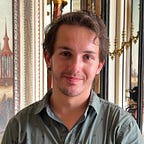A Point About Language and the End of Predictable History
Expect the unexpected in the 21st century
People like to say that the world is getting weirder; more erratic; harder to define. You could argue that is both the least and the most true right now that it has ever been. What is undeniable is that the rules which used to predictably guide world events up until recently have broken down in front of us without our realizing. Though you could presume that an all-time high in global interconnectedness would bring about a corresponding high in global mutual understanding, I think most would agree that your presumptions would leave you misled about the state of the world today.
Immediately, many might think to blame Internet misinformation for a world in which every truth feels relative and nothing is as it seems, and they would be right to do so to some extent, but what I would like to put forward as a complimentary explanation is that the general public’s collective cluelessness is due to the fact that the progression of industrial society — something, lest we forget, is a totally and radically new historical experiment — has led to the breaking down of patterns which have predictably guided human societies for millennia.
To illustrate this, let’s look at the changing of languages over time. Established, widely spoken languages are increasingly being used to connect otherwise disparate speakers across the globe with standardized vocabularies, dialects and grammatical norms. The Internet and…
